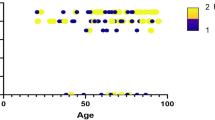Abstract
Purpose
Clinical decision support systems (CDSS) are used to identify drugs with potential need for dose modification in patients with renal impairment. ChatGPT holds the potential to be integrated in the electronic health record (EHR) system to give such dosing advices. In this study, we aim to evaluate the performance of ChatGPT in clinical rule-guided dose interventions in hospitalized patients with renal impairment.
Methods
This cross-sectional study was performed at Tergooi Medical Center, the Netherlands. CDSS alerts regarding renal dysfunction were collected from the electronic health record (EHR) during a 2-week period and were presented to ChatGPT and an expert panel. Alerts were presented with and without patient variables. To evaluate the performance, suggested medication interventions were compared.
Results
In total, 172 CDDS alerts were generated for 80 patients. Indecisive responses by ChatGPT to alerts were excluded. For alerts presented without patient variables, ChatGPT provided “correct and identical” responses to 19.9%, “correct and different” responses to 26.7%, and “incorrect responses to 53.4% of the alerts. For alerts including patient variables, ChatGPT provided “correct and identical” responses to 16.7%, “correct and different” responses to 16.0%, and “incorrect responses to 67.3% of the alerts. Accuracy was better for newer drugs such as direct oral anticoagulants.
Conclusion
The performance of ChatGPT in clinical rule-guided dose interventions in hospitalized patients with renal dysfunction was poor. Based on these results, we conclude that ChatGPT, in its current state, is not appropriate for automatic integration into our EHR to handle CDSS alerts related to renal dysfunction.


Similar content being viewed by others
References
Plana D, Shung DL, Grimshaw AA et al (2022) Randomized clinical trials of machine learning interventions in health care: a systematic review. JAMA Netw Open 5:e2233946. https://doi.org/10.1001/jamanetworkopen.2022.33946
OpenIA ChatGPT. https://openai.com/blog/chatgpt. Accessed 26 Jan 2024
Roosan D, Padua P, Khan R et al (2003) Effectiveness of ChatGPT in clinical pharmacy and the role of artificial intelligence in medication therapy management. J Am Pharm Assoc. https://doi.org/10.1016/j.japh.2023.11.023
Al-Dujaili Z, Omari S, Pillai J, Al Faraj A (2023) Assessing the accuracy and consistency of ChatGPT in clinical pharmacy management: a preliminary analysis with clinical pharmacy experts worldwide. Res Social Adm Pharm 19:1590–1594. https://doi.org/10.1016/j.sapharm.2023.08.012
Morath B, Chiriac U, Jaszkowski E et al (2023) Performance and risks of ChatGPT used in drug information: an exploratory real-world analysis. Eur J Hosp Pharm. https://doi.org/10.1136/ejhpharm-2023-003750
Huang X, Estau D, Liu X et al (2023) Evaluating the performance of ChatGPT in clinical pharmacy: a comparative study of ChatGPT and clinical pharmacists. Br J Clin Pharmacol. https://doi.org/10.1111/bcp.15896
Fournier A, Fallet C, Sadeghipour F, Perrottet N (2023) Assessing the applicability and appropriateness of ChatGPT in answering clinical pharmacy questions. Ann Pharm Fr. https://doi.org/10.1016/j.pharma.2023.11.001
Lee P, Bubeck S, Petro J (2023) Benefits, limits, and risks of GPT-4 as an AI Chatbot for medicine. N Engl J Med 388:1233–1239. https://doi.org/10.1056/NEJMsr2214184
Wasylewicz ATM, Scheepers-Hoeks AMJW (2019) Clinical decision support systems. In: Fundamentals of Clinical Data Science, 1st edn. Springer, Cham, pp 153–170
Drenth-van Maanen AC, van Marum RJ, Jansen PAF et al (2015) Adherence with dosing guideline in patients with impaired renal function at hospital discharge. PLoS One 10:e0128237. https://doi.org/10.1371/journal.pone.0128237
McCann A (2023) Microsoft and Epic expand strategic collaboration with integration of Azure OpenAI Service. Microsoft News Center. https://news.microsoft.com/2023/04/17/microsoft-and-epic-expand-strategic-collaboration-with-integration-of-azure-openai-service/. Accessed 26 Jan 2024
Levey AS, Stevens LA, Schmid CH et al (2009) A new equation to estimate glomerular filtration rate. Ann Intern Med 150:604–612. https://doi.org/10.7326/0003-4819-150-9-200905050-00006
Datt M, Sharma H, Aggarwal N, Sharma S (2023) Role of ChatGPT-4 for medical researchers. Ann Biomed Eng. https://doi.org/10.1007/s10439-023-03336-5
Briganti G (2024) How ChatGPT works: a mini review. Eur Arch Otorhinolaryngol 281:1565–1569. https://doi.org/10.1007/s00405-023-08337-7
Dave T, Athaluri SA, Singh S (2023) ChatGPT in medicine: an overview of its applications, advantages, limitations, future prospects, and ethical considerations. Front Artif Intell 6:1169595. https://doi.org/10.3389/frai.2023.1169595
UK Renal Pharmacy Group (UKRPG) The renal drug database. https://renaldrugdatabase.com/. Accessed 26 Jan 2024
De Koninklijke Nederlandse Maatschappij ter bevordering der Pharmacie (KNMP) KNMP Kennisbank. www.kennisbank.knmp.nl. Accessed 26 Jan 2024
European Medicines Agency (EMA) (2004) Note for guidance on the evaluation of the pharmacokinetics of medicinal products in patients with impaired renal function. https://www.ema.europa.eu/en/documents/scientific-guideline/note-guidance-evaluation-pharmacokinetics-medical-products-patients-impaired-renal-function_en.pdf . Accessed 26 Jan 2024
Food and Drug Administration (2019) Pharmaceutical science and clinical pharmacology advisory committee meeting. https://www.fda.gov/advisory-committees/advisory-committee-calendar/may-7-2019-meeting-pharmaceutical-science-and-clinical-pharmacology-advisory-committee-meeting. Accessed 26 Jan 2024
Food and Drug Administration (2020) Pharmacokinetics in patients with impaired renal function - study design, data analysis, and impact on dosing and labeling. https://www.fda.gov/regulatory-information/search-fda-guidance-documents/pharmacokinetics-patients-impaired-renal-function-study-design-data-analysis-and-impact-dosing. Accessed 26 Jan 2024
Ayers JW, Poliak A, Dredze M et al (2023) Comparing physician and artificial intelligence chatbot responses to patient questions posted to a public social media forum. JAMA Intern Med. https://doi.org/10.1001/jamainternmed.2023.1838
Funding
No datasets were generated or analysed during the current study.
Author information
Authors and Affiliations
Contributions
All authors contributed to the study conception and design. Material preparation, data collection, and analysis were performed by MvN, JS, AE, and RW. Interpretation of the data was performed by MvN, AE, TE, and PvdL. The first draft of the manuscript was written by MvN and AE and all authors commented on previous versions of the manuscript. All authors read and approved the final manuscript.
Corresponding author
Ethics declarations
Competing interests
The authors declare no conflicts of interest.
Additional information
Publisher's Note
Springer Nature remains neutral with regard to jurisdictional claims in published maps and institutional affiliations.
Supplementary Information
Below is the link to the electronic supplementary material.
Rights and permissions
Springer Nature or its licensor (e.g. a society or other partner) holds exclusive rights to this article under a publishing agreement with the author(s) or other rightsholder(s); author self-archiving of the accepted manuscript version of this article is solely governed by the terms of such publishing agreement and applicable law.
About this article
Cite this article
van Nuland, M., Snoep, J.D., Egberts, T. et al. Poor performance of ChatGPT in clinical rule-guided dose interventions in hospitalized patients with renal dysfunction. Eur J Clin Pharmacol (2024). https://doi.org/10.1007/s00228-024-03687-5
Received:
Accepted:
Published:
DOI: https://doi.org/10.1007/s00228-024-03687-5




